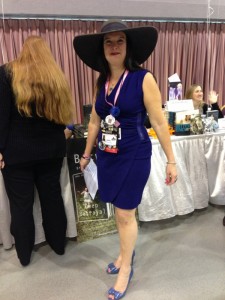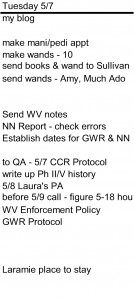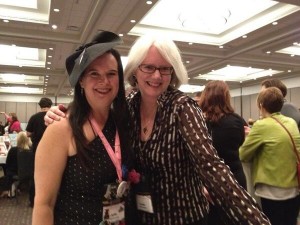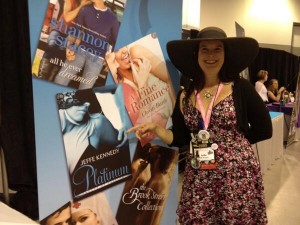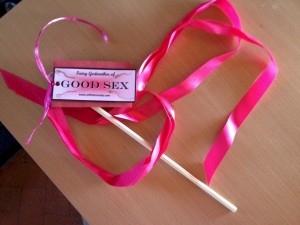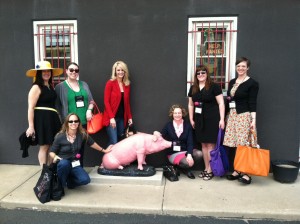 Another photo from the RT Convention. This is me (in the yellow hat, if you don’t know) going out for barbeque with the eKensington group. I’m standing next to Alexandra Nicolajsen, who is the Digital Content/Marketing Manager for Kensington. The rest are other authors, except for the lady kneeling by the pig’s snout. That’s Alicia Condon, Editorial Director of Kensington’s Brava line. Just in case any of you want to stalk her at a conference. 😉
Another photo from the RT Convention. This is me (in the yellow hat, if you don’t know) going out for barbeque with the eKensington group. I’m standing next to Alexandra Nicolajsen, who is the Digital Content/Marketing Manager for Kensington. The rest are other authors, except for the lady kneeling by the pig’s snout. That’s Alicia Condon, Editorial Director of Kensington’s Brava line. Just in case any of you want to stalk her at a conference. 😉
I feel like I have a lot of news to catch up on. I’ve been posting things in dribs and drabs, but I’m not sure where I posted what or who I told which thing. So, it seems like a Fridayish, wrap-the-week up kind of thing to list it all here. Forgive me if this is stuff you all already know.
So…
RUBY, Book 3 in the Facets of Passion series, releases on Monday!!!!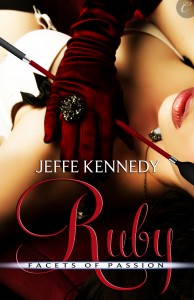 There have been a lot of great reviews already, so I’m really excited for this one to hit the world. I’ve also been giving copies away on Twitter this week to people who sing back the songs to me when I post lyrics. Pretty fun! Maybe I should do it on Facebook, too?
There have been a lot of great reviews already, so I’m really excited for this one to hit the world. I’ve also been giving copies away on Twitter this week to people who sing back the songs to me when I post lyrics. Pretty fun! Maybe I should do it on Facebook, too?
Along those lines, Book 4 in Facets of Passion, ORO, will be in Carina Press’s erotic holiday anthology coming out in December that Angela James is editing. I’m just thrilled about that, especially about the stellar writers I’ll be keeping company with: Christine d’Abo, Jodie Griffin and newbie writers to Carina, Elise Logan and Emily Ryan-Davis.
This weekend (starting today, in fact) is the Southwest Book Fiesta. I’ll be hanging at a booth with my local chapter, the gals from LERA. I’m the Featured Author at the booth from 11 to 12 Saturday, May 11, and again from 5 to 6. Also, at 2pm, I’ll be on a panel with some other romance authors, including the fabulously famous New York Times Bestselling Author Miss Darynda Jones. I fully intend to bask in any glory she happens to reflect.
By way of promoting the Book Fiesta, I was interviewed on local TV. It’s kind of fun to watch – and very brief!
When I was at the World Fantasy Convention last fall, I met this Australian gal, Em Craven, who has a popular website called the E-book Revolution. She later interviewed me via Skype and posted the podcast recently. It’s about an hour long, but we had a really interesting conversation. She comes at things from a more fantasy/science-fiction perspective, a group of readers who’ve been oddly slow in embracing eBooks, especially as compared to the romance community.
In other news, I have confirmation now that my modern retelling of The Phantom of the Opera will officially be called MASTER OF THE OPERA. It will come out in January 2014, in six digital episodes, releasing every two weeks. SO interested to see how it’s received. I’m working on edits for it now and having a great time with my new Kensington editor, Peter Senftleben.
After that, Book 1 of The Twelve Kingdoms will come out in trade paperback in June 2014, with Book 2 in December. Book 1 is the one I called The Middle Princess, but that title will change. The spin-off story Negotiation, a prequel to the trilogy, will be out in an anthology, THUNDER ON THE BATTLEFIELD, Volume II, in June – eBook first, followed by mass-market paperback.
I’m auctioning off two things in Brenda Novak’s big online auction to benefit diabetes research. One is a one-on-one mentorship with me, for you aspiring writers out there. The other is the opportunity to have a meal (your choice, as schedules allow) at the RWA convention in Atlanta with me and the fabulous Carolyn Crane. We’ll treat and you can bring one friend along – or keep us all to yourself! – and dish with you on any topic you like.
Finally – and this is funny – I’ve been talked into having a Street Team. For those who don’t know, this is just a loose association of readers who want to pimp my books to the world. Because this concept always makes me think of Westside Story, the team is officially the Jeffe Jets. Yes, you can absolutely sing the theme song and I think we *have* to get the jackets at some point. At any rate, if you want to play, let me know. If you want to coordinate, even better because I have absolutely no idea what I’m doing.
Whew! I think that’s everything. A lot, right?
Have a great weekend, everyone!

